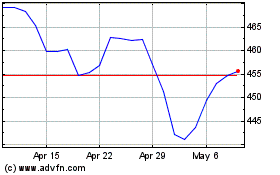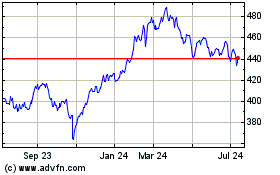Administration Taps Private Sector to Invest in Central America -- Update
May 27 2021 - 5:57PM
Dow Jones News
By Tarini Parti
Vice President Kamala Harris on Thursday unveiled the agreements
of 12 companies and organizations to invest in Guatemala, Honduras
and El Salvador as part of the administration's efforts to deal
with a surge of migrants from Central America at the U.S. southern
border.
Among the companies involved, Microsoft Corp. has agreed to
expand internet access to as many as three million people in the
region by July 2022 and to establish community centers to provide
digital skills to women and youths.
Mastercard Inc. will seek to bring five million people in the
region who currently lack banking services into the financial
system and to give one million micro and small businesses access to
electronic banking. The yogurt maker Chobani has agreed to bring
its incubator program for local entrepreneurs to Guatemala.
Nespresso, a unit of Nestlé SA, plans to begin buying some of its
coffee from El Salvador and Honduras with a minimum regional
investment of $150 million by 2025.
Democratic and Republican administrations have struggled to find
long-term solutions to handling surges in migrants from Central
America, many of whom say they are driven by poverty and violence
in their home countries. The region was hit hard last year by two
disastrous hurricanes.
Biden administration officials have said the aim in part is for
greater private-sector involvement to outlast shifts in policy and
government aid between administrations, reducing over time the
motivations for migrants to make the often dangerous journey to the
U.S. border.
The total number of illegal border crossings this year is on
pace to hit a two-decade high, and a record number of unaccompanied
minors crossed the border illegally in March, followed by a slight
decline in April.
Mr. Biden has delegated to Ms. Harris diplomatic efforts with
Mexico and the three countries known as the Northern Triangle: El
Salvador, Honduras and Guatemala. She is scheduled to make her
first foreign trip to Mexico and Guatemala next month.
Republicans have criticized Ms. Harris over the administration's
overall handling of immigration and have chided her for not yet
visiting the border. White House officials have said her role is
limited to diplomatic efforts, with departments such as Homeland
Security and Health and Human Services in charge of dealing with
migrants crossing into the U.S.
While leading a recent GOP delegation to visit the border, Rep.
James Comer (R., Ky.) said more government investments in the
region wouldn't deter migrants from making the journey to the U.S.
"We've been giving foreign aid to a lot of those countries for
decades, and it's only gotten worse," he said.
Ms. Harris has said that private-sector investment along with
help from nonprofits and the United Nations could speed up progress
in the Northern Triangle. "We must think beyond government," she
said in a speech earlier this month to the Council of the Americas,
a business group that focuses on economic and social development in
the Western Hemisphere.
One potential hindrance for companies has been corruption. The
Northern Triangle countries are among the most corrupt in the
world, according to Transparency International's annual Corruption
Perceptions Index, a global survey of 180 countries.
In Guatemala, a United Nations-led antigraft commission was shut
down in 2019. In Honduras, the government ended the mandate of a
similar although weaker task force last year.
Aides to Ms. Harris said in their discussions with companies
that there was a recognition from the business leaders that some
forms of economic development can begin alongside anticorruption
efforts.
"This is a multifaceted effort that we're going to have to run
now, and all of the different pieces of it simultaneously," said
Mike Pyle, chief economic adviser to Ms. Harris.
Michael Froman, vice chairman and president for strategic growth
at Mastercard, said the company has experience operating in
countries where corruption has been a barrier to development. "Our
view is that we will thrive as a company when countries thrive, and
therefore it's in our interest in terms of the long term," he
said.
Microsoft President Brad Smith said the company's commitment to
expanding broadband access and digital skills could provide the
infrastructure for future investments and job creation in the
region. "The tide goes up in a way that can raise every boat," Mr.
Smith said.
Ms. Harris also called on other companies and organizations
Thursday to invest in public health access, food security,
financial inclusion, clean energy, education and workforce
development in the region, working through the State
Department.
Other organizations that have already made commitments to invest
include the language-learning company Duolingo Inc., the Colombian
bank Banco Davivienda SA and the financial nonprofit Accion.
--Juan Montes and Eliza Collins contributed to this article.
Write to Tarini Parti at Tarini.Parti@wsj.com
(END) Dow Jones Newswires
May 27, 2021 17:45 ET (21:45 GMT)
Copyright (c) 2021 Dow Jones & Company, Inc.
MasterCard (NYSE:MA)
Historical Stock Chart
From Mar 2024 to Apr 2024

MasterCard (NYSE:MA)
Historical Stock Chart
From Apr 2023 to Apr 2024
